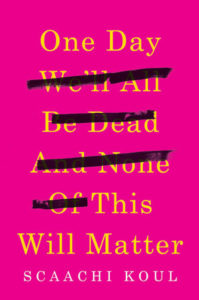Review: ‘One Day We’ll All Be Dead and None of This Will Matter’ by Scaachi Koul
By Alexis Shanley
Posted on

Books of humorous essays can be hit or miss. Too often, the collection lacks cohesion or the humor can feel cloying. Scaachi Koul’s debut, One Day We’ll All Be Dead and None of This Will Matter, is the rare collection in which none of the essays feel expendable. Rather, each one is well-crafted and thoroughly entertaining, balancing keen insight with effortless, acerbic wit.
Koul’s essays largely center around her identity and how it was shaped by her upbringing in Calgary as a child of Indian immigrants, the racism (both subtle and overt) she’s experienced growing up in a predominantly white neighborhood, and the sexism embedded in both Western and Indian cultures. Her experiences feeling like an outsider undoubtedly helped influence her perspective, which is uniquely her own. The topics of her essays range from her fear of flying and stance on arranged marriages, to awkward encounters with her bikini waxer and the rise of rape and surveillance culture. Regardless of how light or dark the subject at hand is, her finely-tuned comedic voice shines through.
One of her most powerful essays is titled “Fair and Lovely” (named for a skin-lightening cosmetic product marketed to South Asian women). Here, she explores cultural reverence for whiteness, both in India and back in Canada. While chronicling a trip she took to see her family, Koul notes that in India, she’s treated as if she’s a white person. Her family are Kashmiris, which are revered in the country for being fair-skinned and are thus associated with being of a higher class. While Canada is less open about such things, Koul makes a point of noting that the two cultures’ attitudes on the subject are similar. She attributes the opportunities she’s had to climb up the ranks in Canadian media in part to the lightness of her skin color: “I’m not white, no, but I’m just close enough that I could be, and just far enough that you know I’m not. I can check off a diversity box for you and I don’t make you nervous—at least not on the surface.” One Day We’ll All Be Dead and None of This Will Matter is filled with bold, unflinching statements like these. Koul is fearless when it comes to exposing the surreptitious ways institutionalized racism has been given license to persist.
The book’s title comes from an essay called “Aus-piss-ee-ous,” a piece that chronicles her cousin Sweetu’s wedding in India. Traditional Indian weddings last seven days and involve a massive amount of preparation, almost all of which falls on the bride’s shoulders. The wedding is the place where the different standards for men and women in Indian society become glaringly obvious: men are free to dress simply and eat and drink whatever they please, while the women are clad in elaborate traditional garb and kept away from the alcohol and indulgent foods. Women are forbidden from dancing in front of men, but during the wedding, a man dressed as a woman dances in front of the men, which is something Sweetu describes as “a big joke. On women.” Sweetu is one of the most endearing peripheral characters we meet in the book; she’s an empowered woman in a culture that doesn’t encourage female empowerment in any marked way.
During the celebration, Koul reconvenes with her father to complain about the patriarchal traditions that he, too, acknowledges are ridiculous. This tension between observing tradition and disregarding its meaning is central to the essay. It’s a clash of past and present, and an awareness that these customs will be difficult to sustain in the future. “The younger girls who were dancing downstairs with the bride, all younger than thirty, were constantly on their phones and their English was flawless and they all wanted to move to America,” Koul writes. “I can’t imagine any of them being happy with the men in their families getting loaded on another floor while they’re resigned to flat soda in paper cups.”
Even when discussing something as dangerous as her experiences being roofied, Koul’s writing is witty, though she appropriately dials back her humor a few notches to avoid being flippant. Her essay “Hunting Season” should be required reading for young women everywhere, as it chronicles several encounters she’s had with men where she noticed she was being surveilled. They were stalking her like prey, waiting for the moment when she would be vulnerable enough to be an easy target to take advantage of. On the surface, “Hunting Season” seems aberrant from the bulk of the other pieces due to its subject matter and its more admonishing tone. Yet, Koul knows what she’s doing. Her pieces largely deal with her identity, and her identity as a woman of color has been shaped by patriarchal societies and the devious behaviors that have been normalized within those societies.
That sounds dark, sure, but let me be clear: this book is extremely funny, and if you’re looking for a breezy read, it won’t disappoint you. My only qualm is that there are moments in which Koul relies a bit too heavily on her humor, sacrificing rich details for jokes. Consequently, some of her stories refrain from soaring beyond the realm of anecdote, but that’s not to say the book as a whole lacks substance. I’m tempted to make a Nora Ephron comparison, which is the highest praise I’m capable of extolling. After all, Scaachi Koul has the same ability to skillfully mine the humor out of her experiences and devastations. You get the sense that she, too, approaches her life with the motto, “Everything is copy.” One Day We’ll All Be Dead and None of This Will Matter introduces us to a promising new voice with a talent for making the personal universal.